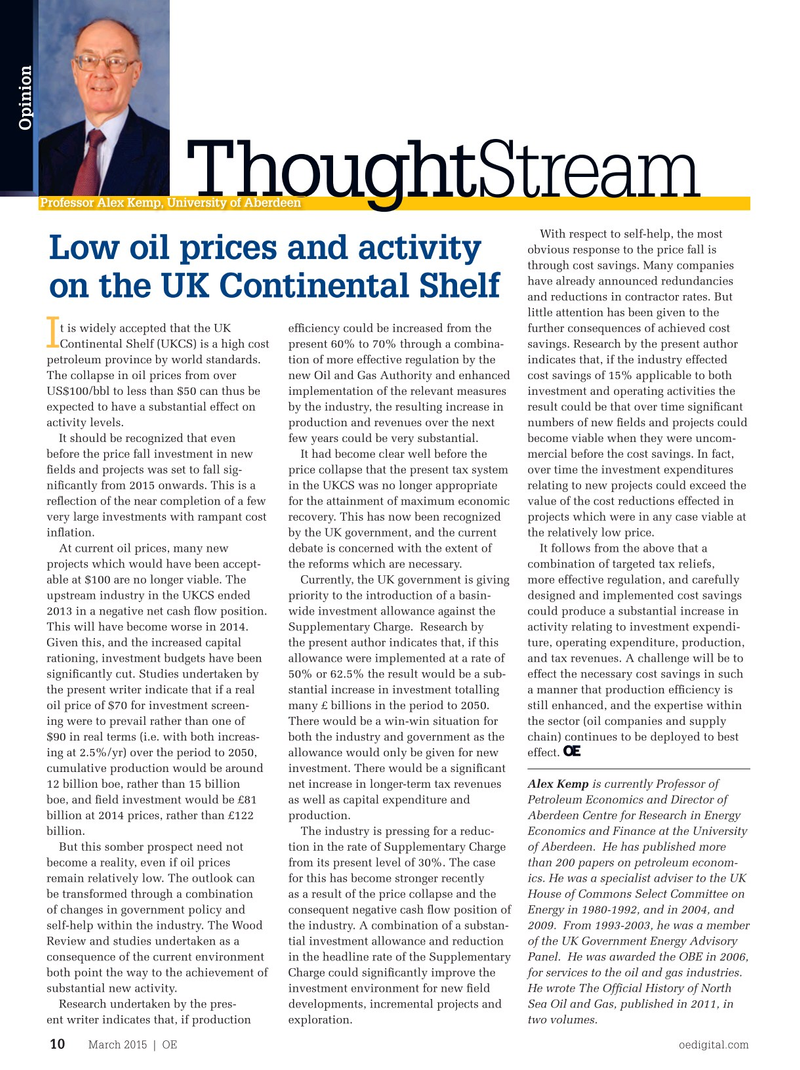
Page 8: of Offshore Engineer Magazine (Mar/Apr 2015)
Read this page in Pdf, Flash or Html5 edition of Mar/Apr 2015 Offshore Engineer Magazine
Opinion
Thought Thought ThoughtStream
Professor Alex Kemp, University of Aberdeen
With respect to self-help, the most obvious response to the price fall is
Low oil prices and activity through cost savings. Many companies have already announced redundancies on the UK Continental Shelf and reductions in contractor rates. But little attention has been given to the t is widely accepted that the UK ef? ciency could be increased from the further consequences of achieved cost
I
Continental Shelf (UKCS) is a high cost present 60% to 70% through a combina- savings. Research by the present author petroleum province by world standards. tion of more effective regulation by the indicates that, if the industry effected
The collapse in oil prices from over new Oil and Gas Authority and enhanced cost savings of 15% applicable to both
US$100/bbl to less than $50 can thus be implementation of the relevant measures investment and operating activities the expected to have a substantial effect on by the industry, the resulting increase in result could be that over time signi? cant activity levels. production and revenues over the next numbers of new ? elds and projects could
It should be recognized that even few years could be very substantial. become viable when they were uncom- before the price fall investment in new It had become clear well before the mercial before the cost savings. In fact, ? elds and projects was set to fall sig- price collapse that the present tax system over time the investment expenditures ni? cantly from 2015 onwards. This is a in the UKCS was no longer appropriate relating to new projects could exceed the re? ection of the near completion of a few for the attainment of maximum economic value of the cost reductions effected in very large investments with rampant cost recovery. This has now been recognized projects which were in any case viable at in? ation. by the UK government, and the current the relatively low price.
At current oil prices, many new debate is concerned with the extent of It follows from the above that a projects which would have been accept- the reforms which are necessary. combination of targeted tax reliefs, able at $100 are no longer viable. The Currently, the UK government is giving more effective regulation, and carefully upstream industry in the UKCS ended priority to the introduction of a basin- designed and implemented cost savings 2013 in a negative net cash ? ow position. wide investment allowance against the could produce a substantial increase in
This will have become worse in 2014. Supplementary Charge. Research by activity relating to investment expendi-
Given this, and the increased capital the present author indicates that, if this ture, operating expenditure, production, rationing, investment budgets have been allowance were implemented at a rate of and tax revenues. A challenge will be to signi? cantly cut. Studies undertaken by 50% or 62.5% the result would be a sub- effect the necessary cost savings in such the present writer indicate that if a real stantial increase in investment totalling a manner that production ef? ciency is oil price of $70 for investment screen- many £ billions in the period to 2050. still enhanced, and the expertise within ing were to prevail rather than one of There would be a win-win situation for the sector (oil companies and supply $90 in real terms (i.e. with both increas- both the industry and government as the chain) continues to be deployed to best ing at 2.5%/yr) over the period to 2050, allowance would only be given for new effect. cumulative production would be around investment. There would be a signi? cant 12 billion boe, rather than 15 billion net increase in longer-term tax revenues Alex Kemp is currently Professor of boe, and ? eld investment would be £81 as well as capital expenditure and Petroleum Economics and Director of billion at 2014 prices, rather than £122 production. Aberdeen Centre for Research in Energy billion. The industry is pressing for a reduc- Economics and Finance at the University
But this somber prospect need not tion in the rate of Supplementary Charge of Aberdeen. He has published more become a reality, even if oil prices from its present level of 30%. The case than 200 papers on petroleum econom- remain relatively low. The outlook can for this has become stronger recently ics. He was a specialist adviser to the UK be transformed through a combination as a result of the price collapse and the House of Commons Select Committee on of changes in government policy and consequent negative cash ? ow position of Energy in 1980-1992, and in 2004, and self-help within the industry. The Wood the industry. A combination of a substan- 2009. From 1993-2003, he was a member
Review and studies undertaken as a tial investment allowance and reduction of the UK Government Energy Advisory consequence of the current environment in the headline rate of the Supplementary Panel. He was awarded the OBE in 2006, both point the way to the achievement of Charge could signi? cantly improve the for services to the oil and gas industries. substantial new activity. investment environment for new ? eld He wrote The Of? cial History of North
Research undertaken by the pres- developments, incremental projects and Sea Oil and Gas, published in 2011, in ent writer indicates that, if production exploration. two volumes.
March 2015 | OE oedigital.com 10 000_OE0315_thoughtstream_em1.indd 10 2/22/15 12:36 PM

 7
7

 9
9